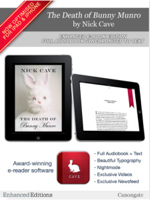
I’m a big fan of Apple products, and a happy owner of the iPhone and iPad. I was one of a couple of million iPhone users who downloaded Stanza ereading application – and proved that Steve Jobs was wrong saying that “people stop reading”.
In view of today’s event, where Apple is going to declare their commitment to digital publishing, I realized I’ve never ever bought a single book in the iBookstore.
To clarify: I didn’t spend a dollar in the iBookstore, but I bought lots of books to my iOS devices, both as book apps in the AppStore or to other ereading applications. One of them was The Death of Bunny Munro by Nick Cave, a fantastic book app developed by Enhanced Editions (AppStore link) – and one of the most outstanding examples of huge possibilities behind digital publishing.
But this story is not about possibilities other content providers give, but about disappointments created by Apple.
Disappointment 1 Spring 2010. Apple launched iPad together with iBooks/iBookstore ecosystem. The application was looking great, as always from Apple. The only problem was the content.
I live in Poland. Only free books from public domain were available, the titles everyone can get vie dozens of other apps and sites, as they come from Project Gutenberg.
Free books? I already had them in Stanza. Interestingly, at the launch of Apple’s ebookstore there was actually more books in the AppStore (120,000) than in the iBookstore (around 60,000).
At that time I was also about to realize that the question of the future is: who will I choose to be my cloud bookshelf? Amazon seems to better know the answer. It’s not about the device, it’s not about the app. It’s about the place where my digital books are archived and synced.
Disappointment 2 First half of 2011. Long in-app purchase battle. Media were very excited about that. Maybe it was something about stock exchange in this who-is-going-to-get-the-cut war, because there was nothing for the reader there.
How it ended, we all know. Amazon, Kobo and other content providers kicked out direct links to bookstores from their apps – in order not to get kicked out from the AppStore. The possibility to easily buy books in the app, offered from that moment only by Apple didn’t encourage me to try it, because I perceived iBookstore as being more expensive in the first place (agency model, remember?).
The other conclusion was more important, however. Only somebody who doesn’t really care or doesn’t know how to get involved in a certain topic, wants to get a cut and forget.
Disappointment 3 The in-app fight was staying at the back of my head when the iBookstore was launched in 26 more countries, including Poland. No matter how discouraged I was, I decided to give it a next chance.
And this was a next disappointment. How come in the ebookstore localized in Poland, books in Polish language were listed below not only English, but also Bulgarian or Slovenian ones? Was that so difficult to set up relevant localization options? And why there was no possibility to search books by language? I know, Apple’s search engine is terribly weak ad there is nothing we can do about it.
I wrote a post with tips on how to find non-English books in the iBookstore, but it’s not bloggers to give such tips, but powerful e-content distributors, who, I assume, want to make more and more money.
I could complain about many other details, but the thing is that my cloud bookshelf is somewhere else (search keyword “Kindle”), so I don’t really care about it any longer. And a nice-looking app on a nice-looking device are not enough to change my preferences.
* * *
Apple look like caring only about devices and buyers. They don’t care about content and users. It’s all too late, too expensive and too US-only. If things are going to continue this way – and I strongly believe they won’t – it’s not only Bunny Munro, who is about to die.
Apple, please give us something magical, which does not include the word “disappointment”.
(Via Ebook Friendly)


































Are buyers not also users?
I live in the US and there are two iPads in our household. I have zero interest in getting suckered into the iBooks ecosystem. Even if I were to allow myself to be locked into a single e-book ecosystem, Amazon makes theirs look much more appealing. As it is, I’m more or less satisfied buying from the Sony store for my old Sony 505.
I get some ebooks from Amazon, but I really like buying via Google these days – because they partnered with local indie bookstores. I can purchase on the web and download to my iPad via the IndieBound app and my local bookstore gets a cut 🙂
Same here. I live in France and I never buy ebooks from iBooks either. The first reason is the lock-in. I like Apple products a lot but there is no reason I won’t change in the future. For example, I’m very interested in the Windows Phones and will probably get one soon. What about my iBooks books then, they would be lost. But I’ll be able to read my Kindle ones, which is of course my bookseller of choice.
The second reason is the limited catalog. When I want to read a book in French, I use the Fnac store. The catalog is much bigger but unfortunately, the Kobo app and the whole book buying process is not as easy as Amazon’s. So sometimes, I go the extra step of removing the DRMs on the Fnacebook ebooks I buy (I insist on this important point) to be able to read them with the iBooks app…
This last point is a little convoluted I admit, but it brings me to the conclusion: Apple makes good enough products that we want to use them. They don’t need to strong-arm us into an Apple lock-in. I really wish, and still hope, they can change and change the e-book market for the better. I expressed it in a blog post here: http://www.lefrenchfab.com/post/16064527938/apple-you-can-change-the-ebook-market-for-the